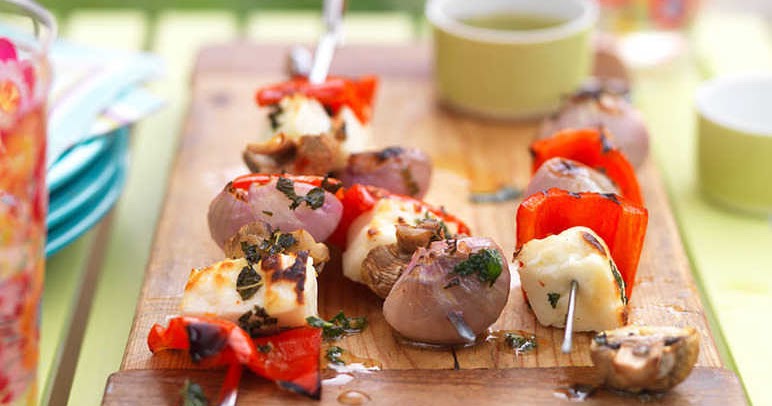Halloumi and Vegetable Skewers : BBQ - Griddle - Grill

These halloumi and vegetable skewers are so versatile, and although this recipe uses red peppers, small shallots and baby button mushrooms, you could use just about any vegetable e.g. courgette (zucchini), aubergine (eggplant) and red onions.
Ingredients:
Serves Four
225 g (lighter) halloumi, cubed2 red peppers, de-seeded and cut into bite-size pieces
8 small shallots, peeled
100 g baby button mushrooms, halved
2 tbsp. freshly squeezed lemon juice
60 ml olive oil
2 tbsp. chopped fresh mint
1 pinch of crushed chillies
Instructions:
1. Spear the halloumi, peppers, shallots and mushrooms, alternating each, onto four metal skewers (if using wooden skewers soak them for 30 minutes first to prevent burning). Arrange in a shallow dish and set aside.
2. Whisk together the dressing ingredients, adding the chilli flakes sparingly unless you like things spicy. Drizzle most of the dressing over the skewers and turn to coat. Marinate for 10 minutes.
3. Heat the barbecue to medium-high (or use a griddle pan over a medium heat if not barbecuing). Cook the skewers for 4-5 minutes, then turn and cook for a further 3-4 minutes, until the vegetables start to soften and char around the edges. Take off the barbecue – the metal skewers will be very hot, so be careful – and drizzle over the remaining dressing.
Nutritional Details:
Each serving provides
27.8g Fat 7.7g Carbohydrate 2.3g Fibre 14.7g Protein
From an original idea here
Halloumi is a firm, slightly springy white cheese from Cyprus, traditionally made with sheeps’ milk, although these days mass-produced varieties often use cows’ milk.
Buyer's guide:
The best halloumi is made from sheeps’ milk, and will come from Cyprus, although these days you can even find varieties made in Britain.
Storage:
Halloumi will keep in the fridge for many months if left in its original packaging, complete with brine or whey. Once opened, submerge in salt water and refrigerate.
Preparation:
In the Middle East, halloumi is usually fried or grilled to take advantage of its high melting point. Although halloumi can be eaten straight from the packet, some chefs recommend soaking it in buttermilk for a day or two before preparing, to give it a richer, less salty flavour.
A variety of recipe ideas are found within this blog, and not all may be suitable for you. If you may have any food allergies, or underlying health issues these must always be taken into account. If you are a diabetic and not sure how certain foods may affect your blood sugars, test is best, i.e. use your meter.
All the best Jan


Comments
Post a Comment